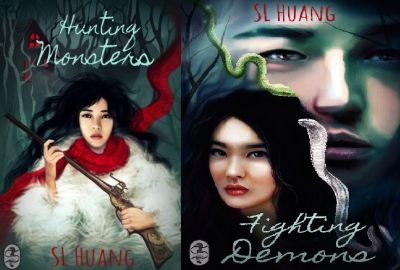Now He’s Dead
“Hunting Monsters” &“Fighting Demons.”
By S L Huang

19 Mar, 2021
0 comments
You may have read (or heard about) S. L. Huang’s 2020 novel Burning Roses. You probably haven’t heard about Huang’s two stories in the same setting, 2014’s “Hunting Monsters” and 2015’s “Fighting Demons.” They created a world; Burning Roses is a sequel. I read the novel first and enjoyed it enough to seek out the stories (which I also enjoyed).
Both stories involve Xiao Hong, her mother Mei, and Mei’s lover Rosa. They are set in a secondary fantasy universe of the sort encountered in fairy tales, both European and Chinese.
“Hunting Monsters”
Ever since she was a little girl, Xiao Hong’s mother Mei and her auntie Rosa have taught Xiao to never kill grundwirgen. Although they can take the form of animals, grundwirgen are people and protected by the King’s Law. To kill one would be murder. The women live as hunters and it would be very easy for a hunter to accidentally shoot a grundwirgen thinking it was an animal, thus the thorough schooling on this point.
It is therefore quite unexpected when the King’s Men descend on Mei and Xiao Hong’s cottage to drag Mei off on charges of murdering a grundwirgen. Mei would never kill such a being, yet according to the King’s Men she has.
Of course, the easy explanation is that it is all a horrible misunderstanding. Unfortunately, the facts are not on Mei’s side. She was for seven years the prisoner of a grundwirgen, a prince who needed a girl to break his curse. Mei is now free. The grundwirgen is dead. Connect the dots.
Nevertheless, Xiao Hong persists in trying to clear her mother’s name. It is a quest whose cost she cannot predict.
“Fighting Demons”
Years after the events in “Hunting Monsters,” Mei resolves to track down Rosa. Rosa could be anywhere in the world, but Mei believes she knows where Rosa was most likely to have fled: to the East, in the direction of Mei’s birthplace. Much to Xiao Hong’s displeasure, her mother insists Xiao Hong accompany her mother to a land whose customs are utterly unfamiliar.
Meng Jiao has a simple dream: to be the most exemplary son possible, win the highest scholarly accolades, travel to Thunder Peak Pagoda, and so impress judgemental Fa Hai that the ferocious monk will have no choice but to set free Meng Jiao’s snake demon mother, Lady Bai. Meng Jiao has accomplished most of his goal, save the final one of freeing his mother.
Before he can speak with the monk, Meng Jiao encounters an unexpected impediment: his snake demon sorceress aunt Xiao Qing. Xiao Qing has with her an army of demons and other allies. Meng Jiao brought some ripe fruit with which to impress the monk. Compared with arcane magic and fell beings, academic achievements and tasty snacks seem rather pitiful weapons.
Among Xiao Qing’s allies: Mei and her disgruntled daughter. Thus, the stage is set for Meng Jiao and Xiao Hong to meet, to compare quite dissimilar values, and so be transformed.
~oOo~
Although as I say these were both set in a secondary fantasy universe of the sort encountered in fairy tales, there is an important difference in that these two stories are much less about adventures of the sort featured in fairy tales and much more about what happens after the stories end. Because stories don’t end; the writer just picks an appropriate moment to halt the narrative.
One might expect that, in a setting that features a number of cultures1, some would come off better than others. In this world, every region seems to feature story-potential-enhancing drawbacks: Meng Jiao’s homeland places huge familial obligations on the young, whereas Xiao Hong’s birthland is lamentably in possession of a legal system that seems far less interested in facts than it is keeping the aristocracy happy2. The affront sparked by the death of Mei’s kidnapper seems to be less because the dead man is a beast person and more because he was a prince, Even one dead prince whose murder is not followed by immediate, brutal punishment sends an alarming message to the peasantry.
I thought both stories nicely done. Even better, the manner in which the three stories are structured means one can read the novel first without spoiling the first two stories. They await your reading pleasure.
“Hunting Monsters” is available here. “Hunting Demons” is available here.
1: The two regions depicted (which are not our West or East and from which no generalizations about the real world should be drawn) differ in their fantastic taxonomies. Grundwirgen is an all-encompassing term that does not distinguish between obnoxious cursed princes and sorcerous snake ladies. Meng Jiao’s homeland, in contrast, takes such entities on a case by case basis, which is less convenient conversationally but also less likely to lead to unrealistic expectations.
2: Among issues that might make aristocrats unhappy: presenting a prince with a previously undisclosed child. Thus, while Xiao Hong’s unnamed biological father is nobly born, she does not seek him out; it’s quite possible the family reaction would be to eliminate any problems that Xiao Hong might pose by depositing her in a shallow, unmarked grave.
